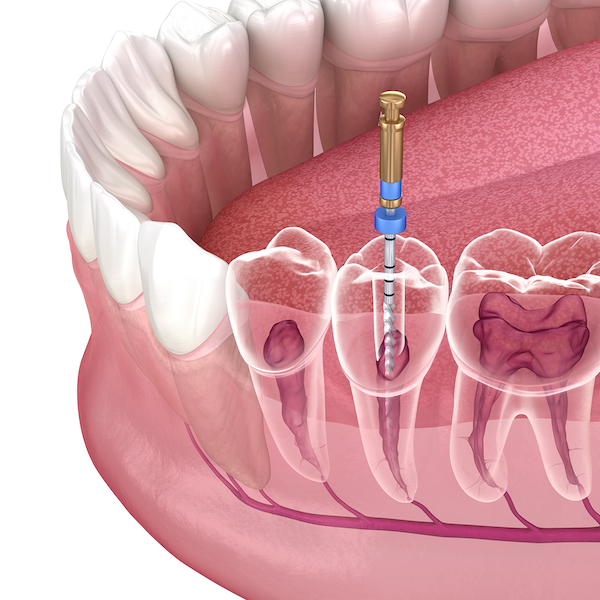

Many people can be very scared when they are recommended to have a root canal. That response in natural to have but having the information to know what a root canal actually is and why it is often recommended can help ease those fears for patients. It is first important to note that a root canal procedure should not be painful. The pain people feel is usually before the procedure, from their infected tooth. There is occasionally some soreness after if there is an infection that needs to heal but that is very normal.

Root canals treatment or therapy is the removal of the internal portion of the tooth that contains blood vessels and nerves. The procedure cleans out and disinfects this area. When that is completed, the roots are filled with sealer and a rubber filling material. This seals the root ends off and prevents re-infection of the root. Many people think that the procedure involves the removal of your root. This is not correct. The tooth remains in the mouth and the roots remain attached to the bone. You won’t even know the difference between this tooth and any other tooth, except the tooth with the root canal will no longer feel hot or cold.
In this case the nerve of the tooth has died, typically due to Trauma or Decay / Bacteria getting into the nerve. The tooth may or may not have pain but is most often seen as a shadow at the end of the root on X-rays. If pain is present, it is often due to tapping on the tooth or chewing. Sometimes the tooth may be discolored (often seen on traumatized front teeth). This is considered an INFECTED TOOTH. The infection WILL NOT heal on its own or with antibiotics and must be treated. Failure to do so can lead to many health issues.
This is when the nerve of the tooth becomes inflamed. A large cavity close to the nerve, a fractured tooth, or trauma are most often the cause. This situation almost always involves severe pain (tooth ache). The tooth is often sensitive to hot or cold with lingering (feeling lasts more than 15 secs). Spontaneous pain (pain for no reason) or pain that wakes you up from sleep are common signs.
This is when the nerve is exposed when the dentist is working on the tooth for a filling, crown or other restoration. The tooth in this case will often need a root canal. That is not always the case though, so this situation should be discussed at more length with your dentist.
This is a rare occurrence when the tooth starts to eat away at itself. It is important to treat this situation ASAP as it can often lead to tooth loss. Root canal is usually necessary to fix this problem.
The most important part of a Dentist/ Patient relationship is communication. Your dentist should ALWAYS be able to explain why you need a Root Canal. There are many situations that a root canal can be avoided even though it may look similar to situations where it was necessary. Although Root canals are a safe procedure, it is best to avoid having them if they are not necessary.
While there are many ways to avoid tooth loss or needing a Root Canal, the main way is prevention. Good oral hygiene and regular dental checkups is the best way to ensure that small issues don’t get larger. While this may seem like common sense, it is neglecting these things that often leads to large problems. There are, however, situations that may not be so apparent to the average dental patient that can help avoid needing a root canal.
New techniques and materials in dentistry have given dentists the ability to avoid the need for root canals. If the above reasons for needing a root canal are not present( ie the nerve is alive and no infection is present), then a pulp cap can be used to avoid root canals when large cavities are present. Several tests are required to ensure whether this procedure can be successful or if a root canal is necessary. If your dentist is not testing your tooth, you may be receiving treatment you don’t need. Pulp caps, when done correctly have a 95% success rate and can avoid root canals and subsequent crowns, saving your tooth and also your pocketbook (root canals and crowns can be thousands of dollars). This procedure is a specialty of Arlington Dental Arts and a service we take great pride in providing to our patients).
There are instances when a root canal is necessary and that is okay. If performed well, they have a very high success rate. When they are performed on Posterior (back) teeth, however, the job is not done. In almost all cases, the tooth will require a crown (or Onlay/Overlay) to prevent fracture. Root canal treated teeth in the posterior without a crown have an extremely high fracture rate. If they, fracture (break), the tooth is often non-reparable and requires extraction. Not all Anterior (front) teeth need crowns after root canals need crowns and this is an important distinction and something to keep in mind. In fact, patients often are better off avoiding crowns on Root Canal treated front teeth but not always. It is important to have a conversation with your dentist as to what is best for you.
Periodontal disease is an often pain-free and chronic infection of the gums and bone. Its reversible alter-ego is known as gingivitis, which only initially affects the gums but will progress to periodontal disease. It is important to treat this early on in the gingivitis state before it progresses. Once a patient has either of these disease processes, a regular cleaning (prophy) cannot be performed. Some type of scaling is necessary as treatment. The longer things progress, the worse things get. If treatment is put off too long, periodontal surgery can be necessary or even tooth loss. Periodontal disease is the NUMBER ONE cause for tooth loss.
To find out if you could need root canal therapy, get in touch with our Arlington Heights dental clinic.. You can get on the path to a healthy, beautiful smile the sooner you complete your root canal therapy.
Book a visit to Arlington Dental Arts. Simply fill out the form below and our team will be in touch with you shortly.